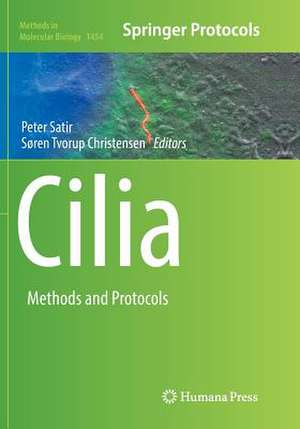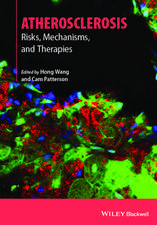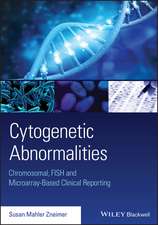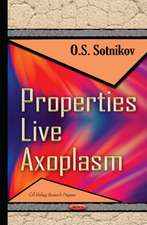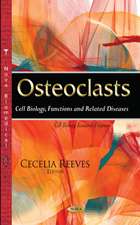Cilia: Methods and Protocols: Methods in Molecular Biology, cartea 1454
Editat de Peter Satir, Søren Tvorup Christensenen Limba Engleză Paperback – 9 iun 2018
Practical and cutting-edge, Cilia:Methods and Protocols is broad and covers motile, sensory, and primarycells. It is a valuable resource to anyone interested in entering the field ofciliary biology using model organisms, including flagellate algae, ciliates,planaria, nematodes, insects, zebrafish, and mammalian cells.
| Toate formatele și edițiile | Preț | Express |
|---|---|---|
| Paperback (1) | 390.84 lei 6-8 săpt. | |
| Springer – 9 iun 2018 | 390.84 lei 6-8 săpt. | |
| Hardback (1) | 400.10 lei 6-8 săpt. | |
| Springer – 12 aug 2016 | 400.10 lei 6-8 săpt. |
Din seria Methods in Molecular Biology
- 9%
 Preț: 791.63 lei
Preț: 791.63 lei - 23%
 Preț: 598.58 lei
Preț: 598.58 lei - 20%
 Preț: 882.98 lei
Preț: 882.98 lei -
 Preț: 252.05 lei
Preț: 252.05 lei - 5%
 Preț: 802.70 lei
Preț: 802.70 lei - 5%
 Preț: 729.61 lei
Preț: 729.61 lei - 5%
 Preț: 731.43 lei
Preț: 731.43 lei - 5%
 Preț: 741.30 lei
Preț: 741.30 lei - 5%
 Preț: 747.16 lei
Preț: 747.16 lei - 15%
 Preț: 663.45 lei
Preț: 663.45 lei - 18%
 Preț: 1025.34 lei
Preț: 1025.34 lei - 5%
 Preț: 734.57 lei
Preț: 734.57 lei - 18%
 Preț: 914.20 lei
Preț: 914.20 lei - 15%
 Preț: 664.61 lei
Preț: 664.61 lei - 15%
 Preț: 654.12 lei
Preț: 654.12 lei - 18%
 Preț: 1414.74 lei
Preț: 1414.74 lei - 5%
 Preț: 742.60 lei
Preț: 742.60 lei - 20%
 Preț: 821.65 lei
Preț: 821.65 lei - 18%
 Preț: 972.30 lei
Preț: 972.30 lei - 15%
 Preț: 660.49 lei
Preț: 660.49 lei - 5%
 Preț: 738.41 lei
Preț: 738.41 lei - 18%
 Preț: 984.92 lei
Preț: 984.92 lei - 5%
 Preț: 733.29 lei
Preț: 733.29 lei -
 Preț: 392.60 lei
Preț: 392.60 lei - 5%
 Preț: 746.26 lei
Preț: 746.26 lei - 18%
 Preț: 962.66 lei
Preț: 962.66 lei - 23%
 Preț: 860.22 lei
Preț: 860.22 lei - 15%
 Preț: 652.64 lei
Preț: 652.64 lei - 5%
 Preț: 1055.50 lei
Preț: 1055.50 lei - 23%
 Preț: 883.87 lei
Preț: 883.87 lei - 19%
 Preț: 491.89 lei
Preț: 491.89 lei - 5%
 Preț: 1038.86 lei
Preț: 1038.86 lei - 5%
 Preț: 524.16 lei
Preț: 524.16 lei - 18%
 Preț: 2122.34 lei
Preț: 2122.34 lei - 5%
 Preț: 1299.23 lei
Preț: 1299.23 lei - 5%
 Preț: 1339.12 lei
Preț: 1339.12 lei - 18%
 Preț: 1390.26 lei
Preț: 1390.26 lei - 18%
 Preț: 1395.63 lei
Preț: 1395.63 lei - 18%
 Preț: 1129.65 lei
Preț: 1129.65 lei - 18%
 Preț: 1408.26 lei
Preț: 1408.26 lei - 18%
 Preț: 1124.92 lei
Preț: 1124.92 lei - 18%
 Preț: 966.27 lei
Preț: 966.27 lei - 5%
 Preț: 1299.99 lei
Preț: 1299.99 lei - 5%
 Preț: 1108.51 lei
Preț: 1108.51 lei - 5%
 Preț: 983.76 lei
Preț: 983.76 lei - 5%
 Preț: 728.16 lei
Preț: 728.16 lei - 18%
 Preț: 1118.62 lei
Preț: 1118.62 lei - 18%
 Preț: 955.25 lei
Preț: 955.25 lei - 5%
 Preț: 1035.62 lei
Preț: 1035.62 lei - 18%
 Preț: 1400.35 lei
Preț: 1400.35 lei
Preț: 390.84 lei
Nou
Puncte Express: 586
Preț estimativ în valută:
74.81€ • 81.29$ • 62.88£
74.81€ • 81.29$ • 62.88£
Carte tipărită la comandă
Livrare economică 21 aprilie-05 mai
Preluare comenzi: 021 569.72.76
Specificații
ISBN-13: 9781493981397
ISBN-10: 1493981390
Pagini: 259
Ilustrații: XIV, 259 p. 54 illus., 39 illus. in color.
Dimensiuni: 178 x 254 mm
Greutate: 0.48 kg
Ediția:Softcover reprint of the original 1st ed. 2016
Editura: Springer
Colecția Humana
Seria Methods in Molecular Biology
Locul publicării:New York, NY, United States
ISBN-10: 1493981390
Pagini: 259
Ilustrații: XIV, 259 p. 54 illus., 39 illus. in color.
Dimensiuni: 178 x 254 mm
Greutate: 0.48 kg
Ediția:Softcover reprint of the original 1st ed. 2016
Editura: Springer
Colecția Humana
Seria Methods in Molecular Biology
Locul publicării:New York, NY, United States
Cuprins
Methods for Studying Ciliary Import Mechanisms.- Targeting of ASH Domain-Containing Proteins tothe Centrosome.- Morphological and Functional Characterizationof the Ciliary Pocket by Electron and Fluorescence Microscopy.- Methods to Study Interactions between Ciliogenesisand Autophagy.- Recombinant Reconstitution and Purification ofthe IFT B Core Complex from Chlamydomonasreinhardtii.- Methods for Studying Movement of Moleculeswithin Cilia.- A FRAP-Based Method for Monitoring Molecular Transportin Ciliary Photoreceptor Cells In Vivo.- Kymographic Analysis of Transport in an Individual Neuronal Sensory Cilium in Caenorhabditis elegans.- Visualization and Manipulation of Cilia and IntraciliaryCalcium in the Zebrafish Left-Right Organizer.- Methods for Studying Ciliary-Mediated Chemoresponsein Paramecium.- STEDand STORM Superresolution Imaging of Primary Cilia.- CLEM Methods forStudying Primary Cilia.- Methods for Visualization of Neuronal Cilia.- Methods to Study Centrosomes and Cilia in Drosophila.- Analysis of Axonemal Assembly during Ciliary Regenerationin Chlamydomonas.- Planaria as aModel System for the Analysis of Ciliary Assembly and Motility.
Textul de pe ultima copertă
This volume is the result of an explosion ofmolecular-based research on Cilia, which began with the discovery of theuniversality of intraflagellar transport (IFT) and ciliary genomics/proteomics.The chapters in this book cover topics such as: high resolution imaging andfunctional characterization of sensory and primary cilia in mammalian cells andzebrafish, methods to study ciliary-mediated chemoresponse in Paramecium,and methods to study centrosomes and cilia in C. elegans and Drosophila.Written in the highly successful Methods in Molecular Biology series format,chapters include introduction to their respective topics, lists of thenecessary materials and reagents, step-by-step, readily reproducible laboratoryprotocols, and tips on troubleshooting and avoiding known pitfalls.
Practical and cutting-edge, Cilia:Methods and Protocols is broad and covers motile, sensory, and primarycells. It is a valuable resource to anyone interested in entering the field ofciliary biology using model organisms, including flagellate algae, ciliates,planaria, nematodes, insects, zebrafish, and mammalian cells.
Practical and cutting-edge, Cilia:Methods and Protocols is broad and covers motile, sensory, and primarycells. It is a valuable resource to anyone interested in entering the field ofciliary biology using model organisms, including flagellate algae, ciliates,planaria, nematodes, insects, zebrafish, and mammalian cells.
Caracteristici
Includes cutting-edge methods and protocols Provides step-by-step detail essential for reproducible results Contains key notes and implementation advice from the experts
